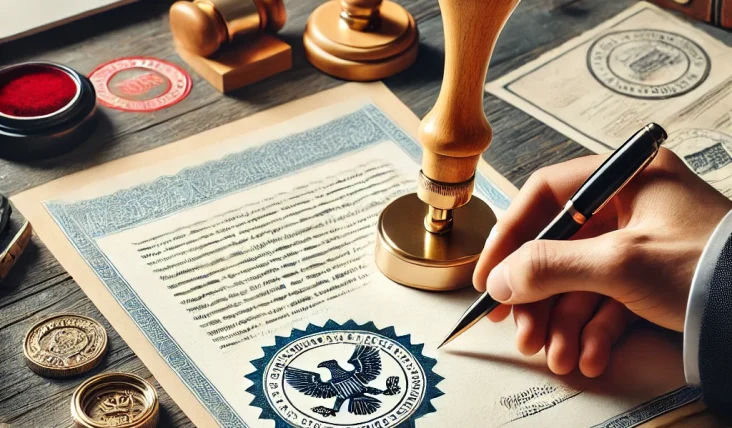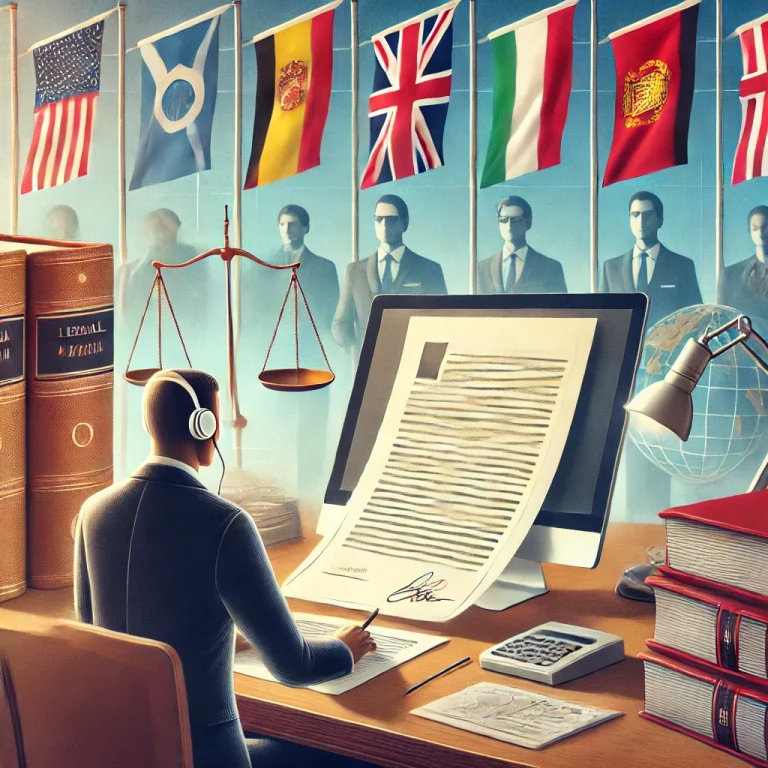In today’s globalized world, the translation of official documents is crucial for governments, businesses, and individuals. Whether it’s translating birth certificates, legal contracts, or immigration papers, accurate and reliable translation services are essential. Small errors can lead to misunderstandings or jeopardize international agreements. Therefore, the process of translating official documents demands precision, a deep understanding of legal language, and compliance with local regulations.
Translation of Official Documents
The translation of official documents involves the precise translation of legally recognized documents, such as birth certificates, marriage licenses, immigration papers, contracts, and business agreements. These documents hold legal significance and must maintain their meaning in the translated version.
What qualifies as an official document?
Official documents are legal or administrative papers, used to prove identity, confirm legal status, or validate official actions. These include academic diplomas, legal contracts, and government-issued documents. In international business, contract translation plays a critical role in ensuring that both parties understand their obligations.
Importance of accuracy in translation
Accuracy is key when translating official documents. Even minor mistakes can lead to legal disputes, financial loss, or administrative issues. It is important to work with certified translators who understand legal terms and implications. Legal translation, especially, requires extreme care, as translators must convey the correct legal meanings of each term.

Legal Translation: A Specialized Field in the Translation of Official Documents
Legal translation presents unique challenges. Unlike general translation, it involves complex terminology that can be difficult to render accurately in another language. To avoid legal complications, only certified translators with legal expertise should handle such documents.
The difference between legal translation and other translations
Legal translation differs from other forms of translation due to the precision it demands. Inaccuracies in legal documents can have serious consequences, including invalidating contracts or causing legal disputes. As a result, legal translators must have a solid understanding of the legal systems involved.
The complexities of legal terminology
Legal terminology is full of jargon and specific phrases. For example, words like “shall” and “may” have very distinct legal meanings, and their misuse can change the entire meaning of a legal text. Translators must understand these nuances to ensure the legal validity of translated documents.
Legal translation in various countries
Different countries operate under different legal systems, and this affects legal translations. Translating legal documents from a common law system (like in the U.S.) to a civil law system (like in France) requires translators to have a thorough understanding of both systems. Only experienced translators can ensure that the legal meaning is accurately conveyed across languages and legal frameworks.
The Role of Certified Translators
Certified translators are legally authorized to translate official documents. Therefore, not just anyone can translate official documents; only professionals who are recognized by relevant authorities can handle these sensitive papers. Learn more about Certified Translator Services.
Who can translate official documents?
Certified translators undergo specific training and are often tested to ensure that they can accurately translate legal documents. In many countries, these translations must also be notarized or apostilled to guarantee accuracy.
Certified translators vs. non-certified translators
Only certified translators are authorized to translate official documents. This ensures that the translations are not only accurate but also legally binding. Courts, embassies, and other institutions rely on certified translations to validate documents.
Contract Translation: Ensuring Precision
Contracts are among the most common types of legal documents that require translation. Any mistakes in contract translation can have serious consequences, such as misunderstandings or breaches of contract.
Why contract translation is crucial?
When businesses engage in international deals, a well-translated contract ensures that both parties clearly understand the terms of the agreement. Any misinterpretation can lead to legal disputes or financial losses. Therefore, precision in translating contracts is essential.
Common challenges in translating contracts
One of the main challenges in contract translation is dealing with legal expressions or idioms that don’t always have direct equivalents in other languages. For instance, English contract law often uses phrases that do not exist in other legal systems, making it hard to translate.
How to ensure precision in contract translation?
To avoid costly mistakes, it’s important to hire specialized contract translators. These professionals are familiar with the legal systems and terms involved in the contract. In addition, using glossaries of legal terms helps ensure consistent and accurate translations.

Quality Control in Official Document Translation
Accurate translation of official documents requires rigorous proofreading and editing processes. Even the smallest error in translation can result in legal problems. Therefore, quality control is crucial.
Proofreading and editing official translations
Once the translation is completed, it must be reviewed by another certified translator. Proofreading ensures that all legal terms are correctly translated, and that the final document is flawless.
Technology vs. human translators: How to balance the two
Although technology can assist in the translation process, it cannot replace human translators when it comes to understanding legal terminology. Human translators can recognize context and intent, which are critical in legal documents. For this reason, human translators are essential in legal translation, while technology is best used as a supplementary tool.
Apostille Certification for Official Document Translation
For translated documents to be legally recognized in foreign countries, they often require apostille certification. The apostille process authenticates the translated document and ensures its international legal validity.
What is an apostille?
An apostille is a certificate that verifies the authenticity of a document for international use. In the context of translation, an apostille certifies that the translated document is an accurate and legally recognized version of the original.
Apostille certification process
The apostille process involves obtaining a certification from the relevant government authority. Once the apostille is applied, the document can be used in countries that are part of the Hague Apostille Convention. This certification is crucial for legal documents used internationally.
Best Practices for Official Document Translation
Translating official documents requires attention to detail and a methodical approach. Avoiding mistakes is crucial, as errors can have serious consequences.
Tips to avoid common mistakes
- Hire certified translators: Only certified professionals should handle the translation of official documents.
- Use glossaries: Legal glossaries help maintain consistency and accuracy in terminology.
- Proofread carefully: Even small errors in official document translations can have significant consequences.
Resources for certified legal translators
To find reliable translation services, organizations such as the American Translators Association (ATA) and the Chartered Institute of Linguists (CIOL) offer directories of certified professionals. These organizations set standards for certification and ongoing training.
SEO Considerations for Translation Services
For translation service providers, SEO is key to making sure your services are visible to potential clients. Therefore, optimizing your content for search engines, including voice search, is crucial.
Why SEO is essential for translation websites?
SEO helps potential clients find your translation services more easily. By using targeted keywords like “translation of official documents”, your website can rank higher in search results. Voice search optimization is also essential, as more people use voice search to find local services.
Conclusion
In conclusion, the translation of official documents is a specialized field that demands legal knowledge, precision, and certified translators. Whether translating contracts or immigration papers, it is crucial to work with professionals who ensure legal accuracy and compliance with regulations. By following best practices, businesses and individuals can ensure that their translated documents are legally valid and accepted internationally.
FAQs
The translation of official documents involves translating legal or government papers, such as contracts and certificates.
Legal translation involves understanding and interpreting specific legal terminology, which often doesn’t have direct equivalents in other languages, making it more challenging.
In most countries, only certified translators are allowed to translate official documents. These translations may also need to be notarized or apostilled to ensure legal validity.
No, contract translation requires specialized knowledge of legal terms and international laws. Certified legal translators with experience in this field are recommended.
An apostille is a certificate that authenticates the document for use in foreign countries. It may be required for translated documents used in international legal or administrative matters.
To ensure accuracy, hire certified translators, proofread the document thoroughly, and use legal glossaries.


